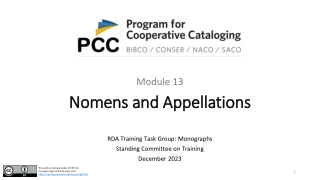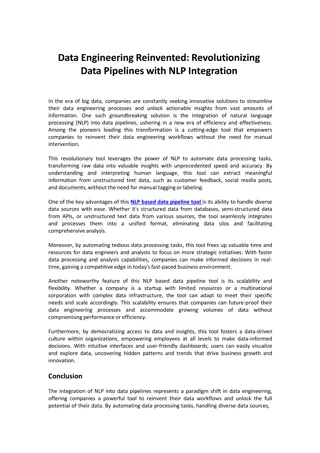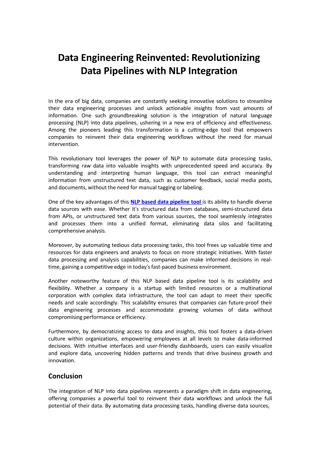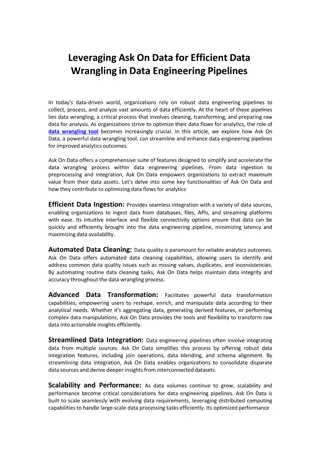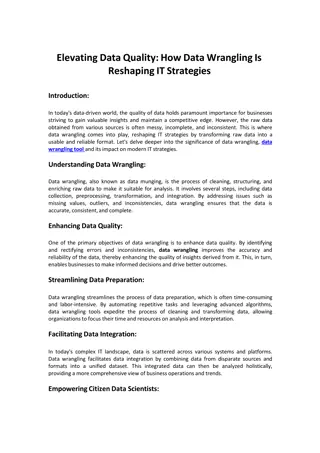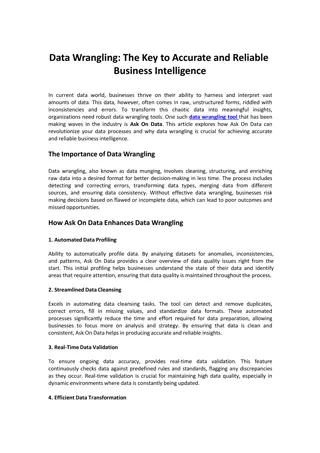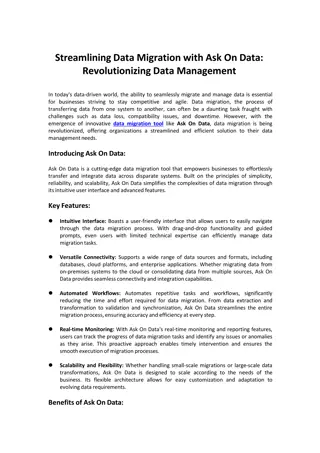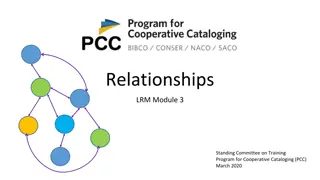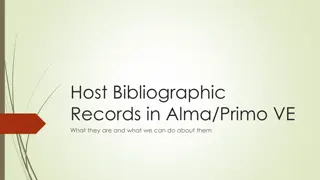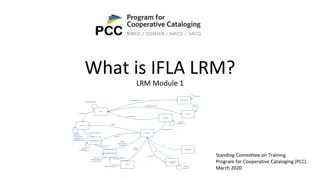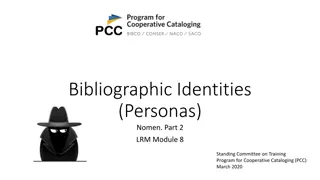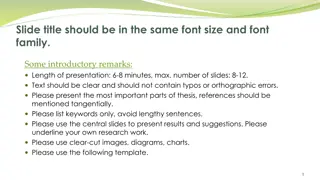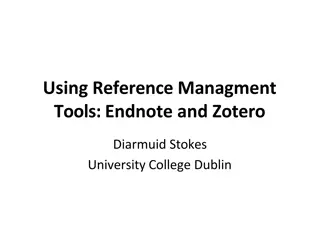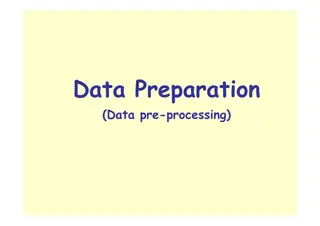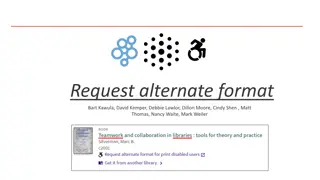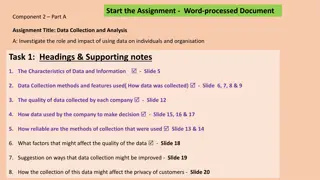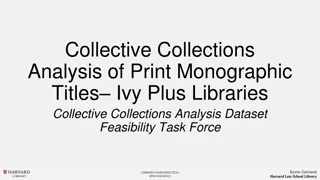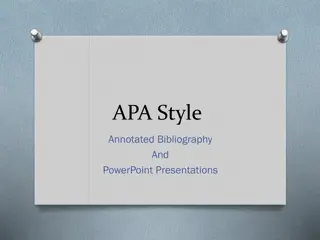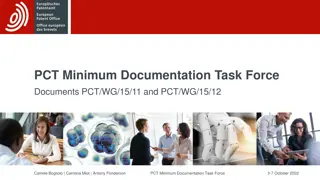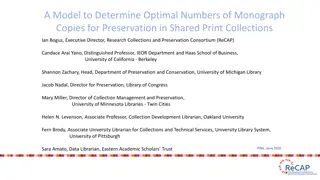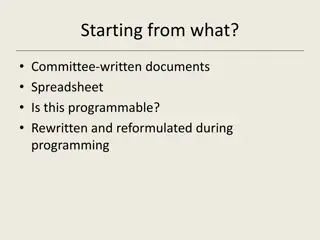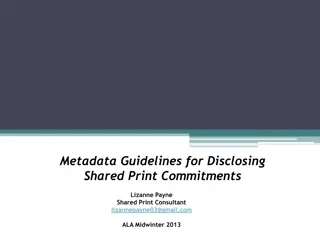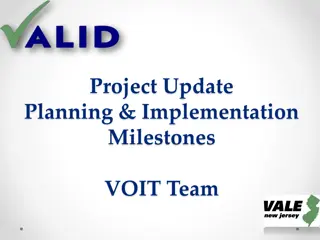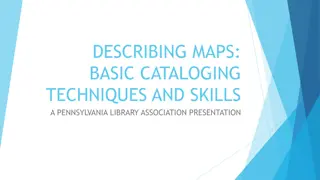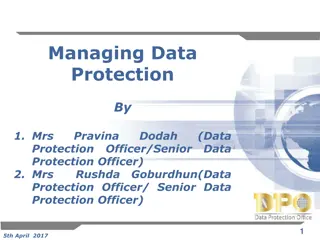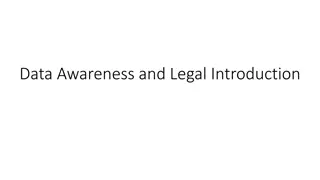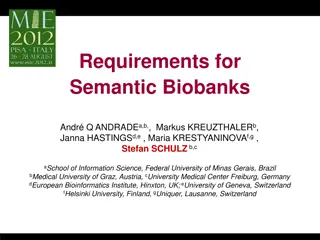Understanding Nomen Entity in RDA Training Module
Explore the development of the Nomen entity in RDA training, differentiating nomen and nomen strings, identifying RDA elements for describing a nomen, and examining relationship elements linking RDA entities with nomens. Delve into the origins and attributes of nomens as defined in FRBR and FRAD sta
1 views • 48 slides
The Digital Personal Data Protection Act 2023
The Digital Personal Data Protection Act of 2023 aims to regulate the processing of digital personal data while balancing individuals' right to data protection and lawful data processing. It covers various aspects such as obligations of data fiduciaries, rights of data principals, and the establishm
3 views • 28 slides
Standards and Formats in Bibliographic Information Exchange
International Standard Bibliographic Description (ISBD) defines rules for creating standardized bibliographic descriptions, facilitating information retrieval in libraries. MARC 21 Format for Bibliographic Data serves as a carrier for bibliographic information across various material types. ISO 2709
1 views • 13 slides
NCI Data Collections BARPA & BARRA2 Overview
NCI Data Collections BARPA & BARRA2 serve as critical enablers of big data science and analytics in Australia, offering a vast research collection of climate, weather, earth systems, environmental, satellite, and geophysics data. These collections include around 8PB of regional climate simulations a
6 views • 22 slides
Revolutionizing with NLP Based Data Pipeline Tool
The integration of NLP into data pipelines represents a paradigm shift in data engineering, offering companies a powerful tool to reinvent their data workflows and unlock the full potential of their data. By automating data processing tasks, handling diverse data sources, and fostering a data-driven
9 views • 2 slides
Revolutionizing with NLP Based Data Pipeline Tool
The integration of NLP into data pipelines represents a paradigm shift in data engineering, offering companies a powerful tool to reinvent their data workflows and unlock the full potential of their data. By automating data processing tasks, handling diverse data sources, and fostering a data-driven
7 views • 2 slides
Using BIBFRAME in a mixed MARC environment
Delve into the intricate world of utilizing BIBFRAME alongside MARC standards at the National Library of Sweden. Discover the benefits of a BIBFRAME catalog, the challenges of maintaining dual terminology, and the ongoing shift towards linked data integration. Gain insights into cataloging practices
0 views • 10 slides
Ask On Data for Efficient Data Wrangling in Data Engineering
In today's data-driven world, organizations rely on robust data engineering pipelines to collect, process, and analyze vast amounts of data efficiently. At the heart of these pipelines lies data wrangling, a critical process that involves cleaning, transforming, and preparing raw data for analysis.
2 views • 2 slides
How Data Wrangling Is Reshaping IT Strategies in Deep
Data wrangling tool like Ask On Data plays a pivotal role in reshaping IT strategies by elevating data quality, streamlining data preparation, facilitating data integration, empowering citizen data scientists, and driving innovation and agility. As businesses continue to harness the power of data to
2 views • 2 slides
Data Wrangling like Ask On Data Provides Accurate and Reliable Business Intelligence
In current data world, businesses thrive on their ability to harness and interpret vast amounts of data. This data, however, often comes in raw, unstructured forms, riddled with inconsistencies and errors. To transform this chaotic data into meaningful insights, organizations need robust data wrangl
0 views • 2 slides
Know Streamlining Data Migration with Ask On Data
In today's data-driven world, the ability to seamlessly migrate and manage data is essential for businesses striving to stay competitive and agile. Data migration, the process of transferring data from one system to another, can often be a daunting task fraught with challenges such as data loss, com
1 views • 2 slides
Understanding Relationships in Bibliographic Universe
Relationships in bibliographic universe connect entities, providing context through entity-relationship models like IFLA LRM. Learn key terms, principles, and diagrams to identify relationships defined in IFLA LRM. Explore domains, ranges, inverse, recursive, and symmetric relationships. Enhance you
0 views • 23 slides
Understanding Host Bibliographic Records in Alma/Primo VE
Explore the concept of Host Bibliographic Records in the Alma/Primo VE system, which address the issue of linking single items to multiple bibliographic records. Learn how host bibs work, their creation during data migration, implications for library services, and the various types of host bibs used
0 views • 24 slides
Understanding IFLA LRM: A Conceptual Reference Model
IFLA LRM, created by the International Federation of Library Associations and Institutions, consolidates FRBR, FRAD, and FRSAD models into a coherent framework. It aims to structure bibliographic data logically and inclusively, focusing on end-user needs and tasks. The model describes interrelated e
0 views • 11 slides
Understanding Bibliographic Identities and Nomen Clusters in Cataloging
Explore the concept of bibliographic identities, factors influencing the use of Nomens for individuals, and the relationship between Nomens and cataloging rules. Learn how one entity may have multiple Nomens and the significance of context in distinguishing between distinct bibliographic identities.
0 views • 12 slides
Environmental Management Thesis at University of Debrecen
Environmental Engineering MSc student at University of Debrecen presents a thesis focusing on environmental management, discussing the problem, goals, material and methods, results, and suggestions. The study covers bibliographic background, legislative aspects, and concludes with practical recommen
0 views • 12 slides
Understanding Data Governance and Data Analytics in Information Management
Data Governance and Data Analytics play crucial roles in transforming data into knowledge and insights for generating positive impacts on various operational systems. They help bring together disparate datasets to glean valuable insights and wisdom to drive informed decision-making. Managing data ma
0 views • 8 slides
Comparing EndNote Web and Zotero Reference Management Tools
Reference management software like EndNote Web and Zotero offer scholars and authors the ability to record and use bibliographic citations effectively. These tools enable easy collaboration, sharing of references, and curating collections of references. While EndNote Web is widely used and integrate
0 views • 22 slides
Importance of Data Preparation in Data Mining
Data preparation, also known as data pre-processing, is a crucial step in the data mining process. It involves transforming raw data into a clean, structured format that is optimal for analysis. Proper data preparation ensures that the data is accurate, complete, and free of errors, allowing mining
1 views • 37 slides
Visual Highlights from British Library: Pin the Tail on the Donkey & Tillett: Bibliographic Relationships
Explore captivating images showcasing the games "Pin the Tail on the Donkey" and delve into bibliographic relationships with Tillett. Witness the fun and scholarly side of these subjects through vibrant visuals. Perfect for those interested in cultural traditions and library resources.
0 views • 4 slides
Enhancing Library Accessibility: Request Alternate Formats for Print Disabled Users
This project focuses on providing accessible library services for print-disabled users by allowing them to request alternate formats, reducing their workload and promoting awareness of available services. The workflow involves users accessing the library website, logging in with ACE tokens, populati
1 views • 24 slides
Cataloging Training Course Overview: FRBR, RDA, BSR
Delve into a comprehensive cataloging training course covering key topics such as FRBR concepts, RDA cataloging instructions, and BSR standards. Each day focuses on specific learning objectives to enhance your understanding of bibliographic records creation. Embrace the journey of mastering FRBR and
0 views • 84 slides
Understanding Data Collection and Analysis for Businesses
Explore the impact and role of data utilization in organizations through the investigation of data collection methods, data quality, decision-making processes, reliability of collection methods, factors affecting data quality, and privacy considerations. Two scenarios are presented: data collection
1 views • 24 slides
Collective Collections Analysis of Print Monographic Titles in Ivy Plus Libraries
The Ivy Plus Libraries are embarking on a project to collect, normalize, and analyze bibliographic and holdings records of single-part print monographs added to their catalogs between 2013-2017. The Task Force aims to enhance collaboration, streamline acquisitions, develop purchasing programs, and o
1 views • 6 slides
Mastering APA Style: Annotated Bibliographies & Presentations
Exploring the world of APA style through annotated bibliographies and PowerPoint presentations. Learn how to combine bibliographic references with annotations, summarize sources, analyze their relevance, and reflect on their impact. Enhance your research and writing skills with these essential tools
0 views • 23 slides
Unlocking the Power of Complex Searches with CCL Queries
Construct precise search filters using Common Command Language (CCL) queries to efficiently list records based on specific characteristics. Explore the commands and access points for creating custom search filters with CQL in Polaris PowerPAC. Learn key codes and tips to enhance your search capabili
1 views • 8 slides
Human Disease Symptom Network: Understanding Disease Relationships Through Symptoms and Genes
The Human Disease Symptom Network (HSDN) is constructed using a large-scale medical bibliographic records database to form a network of human diseases based on symptom similarities. By integrating disease-gene associations and protein-protein interaction data, correlations between symptom similarity
0 views • 37 slides
PCT Minimum Documentation Task Force Updates and Progress Report
The PCT Minimum Documentation Task Force has been working diligently to modernize and standardize PCT minimum documentation for the digital era. Objectives include reviewing patent and non-patent literature, setting criteria for national patent collections, and improving bibliographic data. Challeng
0 views • 28 slides
Optimal Monograph Preservation in Shared Print Collections
A model is proposed by Ian Bogus, Candace Arai Yano, Shannon Zachary, Jacob Nadal, Mary Miller, Helen N. Levenson, Fern Brody, and Sara Amato to determine the ideal number of monograph copies for preservation in shared print collections. The model considers variables such as on-shelf probability, bi
0 views • 11 slides
Tool for Implementing Committee Reports in OCLC Connexion
This presentation uncovers the development process of a tool designed to implement committee reports within OCLC Connexion. From transforming spreadsheets to programming to final outcomes, each step of the tool's internal operation and capabilities is explained. The tool targets specific elements in
0 views • 31 slides
Comprehensive Bibliography on Ancient Greek and Roman Civilization
Explore L'Année Philologique, an international bibliography covering a wide range of subjects related to Ancient Greek and Roman civilizations. With over 900,000 bibliographic records and 575,000 book review references, it serves as a valuable resource for academic research. The database includes p
0 views • 8 slides
Understanding MARC Tags 7XX, 8XX, 9XX in Library Cataloging
Learn about the application of MARC tags 7XX, 8XX, and 9XX in library cataloging. Explore how these tags are utilized for added entries, series data, and internal use within bibliographic records. Discover the significance of MARC tags 700-730 for establishing authorized access points, listing addit
0 views • 26 slides
Metadata Guidelines for Disclosing Shared Print Commitments
Shared Print Metadata Guidelines aim to establish new Shared Print Institution Symbols and add them to bibliographic records for resource sharing. These guidelines involve creating MARC Local Holdings Records (LHRs) to document archiving commitments for journals. The Shared Print initiative supports
1 views • 12 slides
Library Consortium VOIT Implementation Update
Library consortium VOIT team members from various universities in New Jersey collaborate on governance, bibliographic control, and metadata implementation. They focus on investigating specific issues and devising specifications to enhance library systems. Accomplishments in FY2013 include recommendi
0 views • 14 slides
Exploring Map Cataloging Techniques and Challenges
Discover the essential cataloging tools and resources for managing cartographic materials, including descriptive areas of bibliographic records, title selection, scale considerations, and physical descriptions. Learn about the unique characteristics of map cataloging, the differences from other form
0 views • 50 slides
Understanding Data Protection Regulations and Definitions
Learn about the roles of Data Protection Officers (DPOs), the Data Protection Act (DPA) of 2004, key elements of the act, definitions of personal data, examples of personal data categories, and sensitive personal data classifications. Explore how the DPO enforces privacy rights and safeguards person
0 views • 33 slides
Understanding Data Awareness and Legal Considerations
This module delves into various types of data, the sensitivity of different data types, data access, legal aspects, and data classification. Explore aggregate data, microdata, methods of data collection, identifiable, pseudonymised, and anonymised data. Learn to differentiate between individual heal
0 views • 13 slides
Integrating ArchivesSpace with Voyager: Exploring MARC and Beyond
Exploring the integration of ArchivesSpace and Voyager, focusing on repurposing finding aid information as bibliographic descriptions. Discusses steps taken, including MARC record review, NYU's MARC export plugin, local transformation files, and the use of MarcEdit. The goal is automation with ongoi
0 views • 7 slides
Requirements for Semantic Biobanks and Global Biobank Data Retrieval
Explore the critical aspects of semantic interoperability in biobanking, highlighting the need for formal ontologies, comprehensive annotations, and model of meaning data. The (Generalized) Biomedical Retrieval Scenario underscores the importance of effective resource retrieval based on content-base
0 views • 16 slides
Overview of RDA: Resource Description and Access
An in-depth look at RDA (Resource Description and Access), covering its origins, development by the Joint Steering Committee, transition from AACR3, and key concepts such as representation principles and data sharing beyond libraries. The test period of RDA Toolkit revealed its impact with over 10,0
0 views • 27 slides
